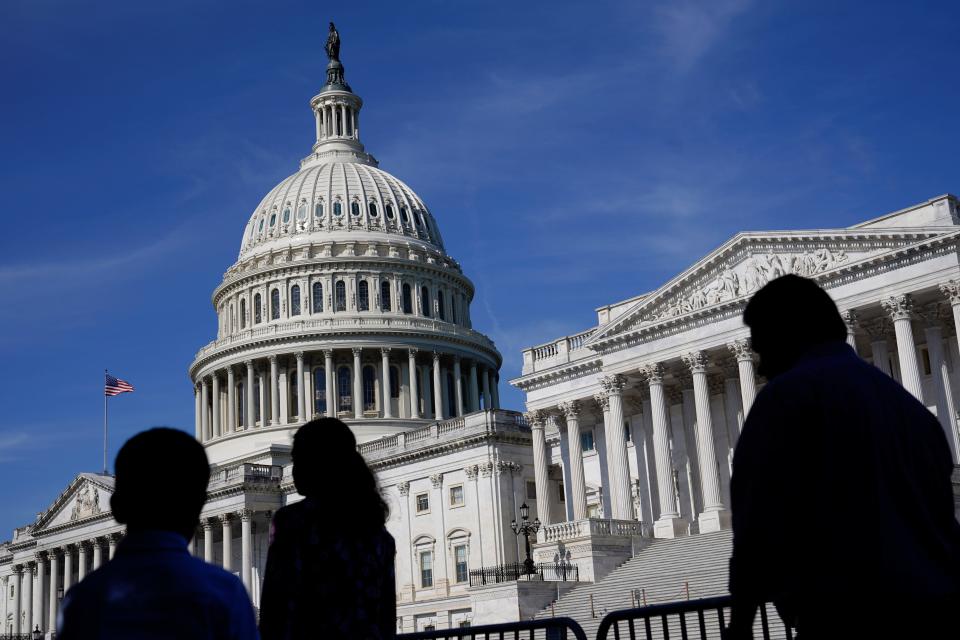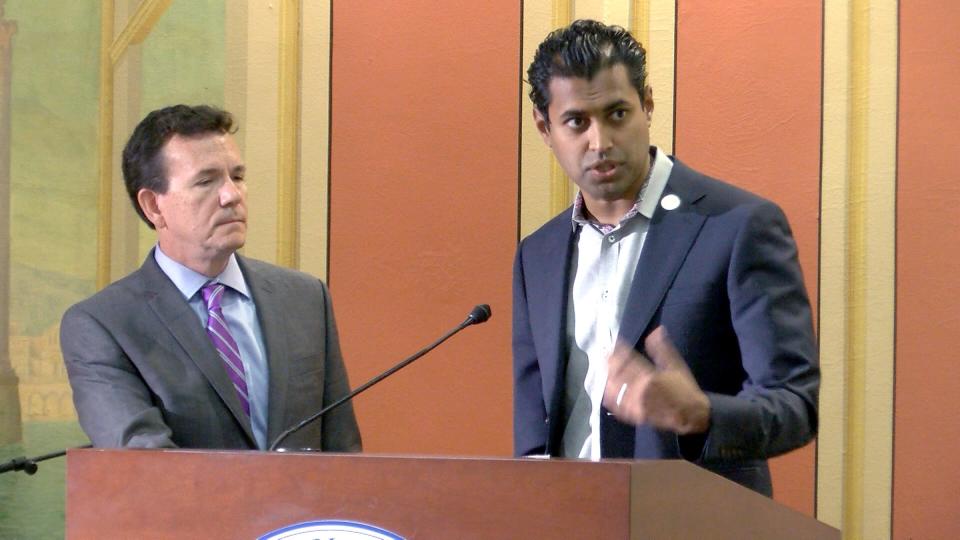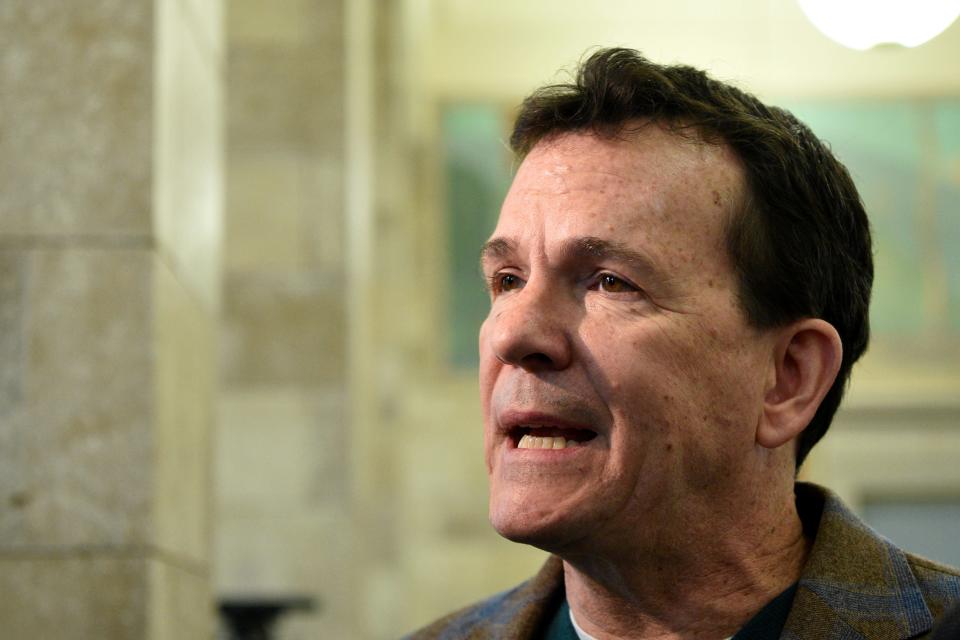After the midterms, can America find common ground? Here's how it could | Mike Kelly
Sometime in the coming days or weeks, the acrid election smoke will clear and America will come face-to-face with yet another perplexing political rubble pile.
Think of it as the aftermath of a devastating fire at a once-grand mansion. Some rooms will be salvageable. Some not.
The good news is that all those annoying TV political ads will disappear like vampires who have to hide when the sun rises. The bad news is that the bitter stew that Democrats and Republicans cooked during decades of culture wars will still be simmering on a very hot fire.
And that may be just the beginning of the problems.
With piles of mail-in ballots to be checked and all manner of so-called volunteers issuing challenges to voters, we may not know for weeks which party controls Congress.

But at some point, America will have to face reality: The government is expected to function. Political enemies will need to lay down their rhetorical swords and get something done. The real question now is how two parties who treat each other as if they are fighting a grandiose, often-comic battle for control of the moral universe can — OK, wait for it — compromise.
Already experts agree that some issues are off the table.
Abortion is one. Don’t expect federal legislation, experts say, to protect or curtail abortion. The same is probably true of national safeguards for transgender rights, relaxed voting standards or even a major condemnation of the Jan. 6 assault on the U.S. Capitol.
But plenty of other issues offer room for some small measure of bipartisanship compromises, from education to crime, infrastructure and immigration.
This kind of give-and-take level of politics won't be easy to achieve. In many ways, it may be impossible.
More Mike Kelly:The Democrats are in trouble. The signs were there in plain sight
A season of gridlock?
If you doubt this, consider what took place during the last two years of a Congress that sometimes appeared to be more of a jumbled reality TV show script that combined themes from “Survivor” and “Fixer Upper” — with, perhaps, some elements of the YouTube video staple “America’s Worst Road Rage and Public Freakouts.” Add to this a continuing problem of social media spreading falsehoods and conspiracy theories and you have a framework for a political swamp.
There is some degree of hope, however.
Despite all manner of problems — including a deadly attack on the Capitol while the House and Senate confirmed the election of President Joe Biden — Congress actually managed to pass bipartisan legislation during the last two years on gun control and upgrades to infrastructure, not to mention other measures to protect the microchip industry.
But don’t expect the kind of sweeping legislation that defined Lyndon Johnson’s presidency in the 1960s or Ronald Reagan’s in the 1980s.
“In Washington, I think it’s going to be difficult to do big stuff,” said Benjamin Dworkin, the director of the Rowan Institute for Public Policy & Citizenship. “There are just some very fundamental disagreements.”
Another factor that may limit compromises, Dworkin said, is the looming 2024 presidential election and a possibility that a significant number of House and Senate Republicans may run for the White House.
“There are half a dozen members of Congress who think they will be the Republican nominee,” Dworkin said. “They have no desire to give anything to the Biden administration. They will be incentivized to prevent any kind of compromise from working it’s way through the system.”
Ross Baker, the noted Rutgers political scientist who has studied Congress for decades, agrees that gridlock may be the defining characteristic of both the House and the Senate — and, also, the White House — for the next several years.
“I would be happy if they were able to pass an annual budget,” Baker said. “I would consider that alone a major act of bipartisanship.”
Baker compares the recent legislative inaction in the House and Senate to the same pattern in Congress before the Civil War of the 1860s. Just as slavery brought Congress to a standstill in the years leading up to the Civil War, Baker said, the upcoming Congress will likely be unable to agree on significant changes in such controversial issues as environmental laws that are aimed at climate change.
“One thing you can pretty much count on is there won’t be anything in the environmental area,” Baker said. “Climate change denial is going to rage.”
But Baker said senators and congressional representatives are also realists. They don’t want to face the same fate as a Republican-dominated Congress in 1948, when then-President Harry Truman, a Democrat, managed to win a close reelection by labeling the GOP-led Congress as “do nothing.”
“It’s not good for either side to show up in 2024 with nothing,” Baker said. “If Congress is barren of accomplishments, somebody is going to take the blame for it.”
One model for possible compromise can be found in New Jersey, where two state senators — a Democrat and a Republican — recently held an online forum titled “Can we agree on anything?”
It turns out that state Sen. Vin Gopal, a Democrat from Neptune, and state Sen. Declan J. O’Scanlon Jr., a Republican from Marlboro, are not shy about their political differences. But they also found enough common ground to sponsor more than 100 bills together.

Gopal and O’Scanlon, who represent swaths of Monmouth County, are not trying to remake politics on a grand scale. Their areas of agreement include allowing residents to grow their own marijuana, relaxing some vaccine mandates and simplifying state brewery regulations. Not exactly LBJ's "Great Society" or Reagan's notion of "Morning in America."

But the two actually admit that they like each other. Amid America’s strained politics, simply having politicians from opposing parties display some measure of friendship may be a huge accomplishment.
In another political wrinkle that could offer a template for cooperation and compromise, Rep. Josh Gottheimer, the Wyckoff Democrat, who co-chairs the decidedly bipartisan House Problem Solvers caucus, based much of his campaign this year on his ability to work with all sides.
“I recognize if the extreme left is complaining that I'm too conservative and the far right that I'm too liberal, then I'm doing exactly what you hired me to do,” Gottheimer said during a recent debate.
Whether such a strategy will work is a key question in Gottheimer's campaign strategy. Despite a campaign war chest of more than $13 million, Gottheimer has had trouble distancing himself — in his increasingly Democratic district, which runs across North Jersey — from his opponent, Frank Pallotta, a Republican conservative.
But if Gottheimer wins, experts say, his brand of bipartisanship could be a influential model in whatever legislation Congress is able to pass.
What follows are several areas where Republicans and Democrats might actually find common ground.
Immigration
No doubt, immigration has become a political lightning rod.
Don’t expect a compromise on such hot-button issues as amnesty for the estimated 12 million undocumented immigrants now living in the U.S. The same is true of so-called “Dreamers,” or children of undocumented immigrants who were brought to the U.S. by parents who crossed the border illegally.
But one possible compromise, experts say, could be found in loosening standards for guest worker immigrants.
The pressure to rewrite guest worker regulations comes in part from the massive influx this year on the nation’s southern border of undocumented migrants claiming asylum. What many asylum-seeking migrants really want is a job. With many American businesses, from restaurants to retail stores, struggling to hire low-paid employees, experts wonder if a new guest-worker program could be established as part of an immigration deal.
Crime
With many communities calling for more police, experts say Congress could step in with increased funding. But to win Democrats, as part of a compromise package, such funding plans should also include training incentives to help police deal with a rise in volatile confrontations with homeless people who suffer from a variety of emotional problems.
To please progressives, Democrats may have to push for non-lethal means of defusing confrontations, especially in minority communities. But many police welcome this kind of new training. So this kind of compromise may not be as hard as it seems.
Education
Experts say Republicans and Democrats should not shy from striking a bipartisan deal with school funding. The key is to avoid thorny debates on such issues as critical race theory or whether public school libraries should include books that explore transgender issues.
The key to compromise, experts say, lies in the COVID pandemic and what educators see as a potential “lost generation” of students who have fallen behind in math and reading.
Appropriating funding for remedial classes — or even more teachers — to help students who have fallen behind could easily attract Republicans and Democrats of all stripes.
Infrastructure
Yes, Congress passed the biggest infrastructure bill in decades. But it’s barely enough to solve the overall problem of broken bridges, outdated roads and rusty rail lines.
Construction jobs are generally popular with voters on all parts of the political spectrum. Republican and Democratic districts alike are filled with plenty of examples of infrastructure projects that need money. All Congress has to do is draw up a list, experts say. If enough Republican and Democratic districts get money, the votes by former congressional enemies will follow.
A bare-minimum menu
Immigration. Crime. Education. Infrastructure. These are just a bare-minimum menu for compromise, experts say. But they are hardly a pie-in-the-sky proposal.
“The news of the death of bipartisanship is somewhat exaggerated,” said Rowan University’s Benjamin Dworkin.
But he added this caution: “It will take a unique set of circumstances to pull it off.”
It still remains to be seen whether Tuesday’s election will offer anything more than just another reason for Republicans and Democrats to remain divided. Or, amid the rubble, can the seeds of bipartisanship grow?
Mike Kelly is an award-winning columnist for NorthJersey.com as well as the author of three critically acclaimed non-fiction books and a podcast and documentary film producer. To get unlimited access to his insightful thoughts on how we live life in New Jersey, please subscribe or activate your digital account today.
Email: kellym@northjersey.com
This article originally appeared on NorthJersey.com: 2022 midterms: Can America find common ground after the election?
